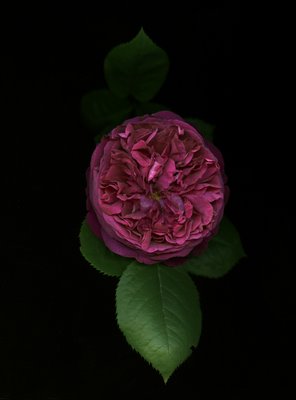Falstaff In The Focative Case
Friday, July 03, 2009

For once Rebecca, Rosemary and I agree on something about the garden. The three of us have gone nuts for old roses that are red or crimson. We are particularly into the once-blooming Gallicas (including our fave ‘Charles de Mills’) as they have the peculiarity of fading into beautiful purples, gray blues and sometimes a metallic blue. So when we find roses that fit all those requirements (including, of course a strong old rose scent) plus the plant in question is remontant (Rebecca would tell you that it means that the rose bush in question re-blooms throughout the summer) we are in rose heaven. We already have in the garden David Austin’s beautiful ‘William Shakespeare’. This rose was supposed to be a dud so Austin took it out of the market and introduced an improved version with the unpoetic name of ‘William Shakespeare 2000’. The fact is that with some tender and loving care my ‘William Shakespeare’ is doing just fine right next to a new plant (new in our garden this year) ‘William Shakespeare 2000’.
It was last year at the Vancouver Rose Society’s rose show at VanDusen that both Rebecca and Rosemary spotted a English Rose that somehow had escaped my notice. It was a beautiful crimson ‘Falstaff’. This year I ordered a plant and plunked it into the garden. Note the scan of one of the blooms that I cut this afternoon.
This spring Rebecca told me she, too, wanted ‘Falstaff’. Her father had told her that unless she took care of her plants she was not to have any more roses in her plant-in-pot garden. I did not pursue the matter and now it seems that Rebecca has developed a renewed interest in taking care of her plants and she is most proud of them. One day Rebecca went to Southlands with her other grandmother and spotted ‘Falstaff’. Rebecca checked her pocket and she needed some more money to buy her plant. I suspect that her grandmother saw this as a child’s passing fancy so she did not add to Rebecca’s money pot and the rose was not purchased. She must have made a loud fuss on how fantastic the plant was because when I returned the next day to buy it for her it had been sold.
There is one consolation here for Rebecca and that is that Rosa ‘Charles de Mills’ is a rose that sends underground runners. My ‘Charles de Mills’ has two ancillary plants. One of them is in bloom with many flowers. Rebecca knows that when the plant is semi dormant in the fall I will dig it out and the plant will be hers.
As I brought in ‘Falstaff’ to scan it I thought of one of my favourite books by Anthony Burgess. Burgess seems to be a an author who was underappreciated when he was alive. Perhaps it had to do with the fact that he was a prolific author. The book in question is called 99 Novels – The Best in English Since 1939. The book ends with Norman Mailer’s 1983 Ancient Evenings and it starts with Henry Green’s Party Going.
The bringing in of ‘Falstaff’ brought to mind 1976 as Burgess lists for that year, Robert Nye’s Falstaff.
This is what he writes about the book which I will have to now find at the library.
François Rabelais presents characters, even though some of them are giants, and events, even though many are implausible, and so may be considered a novelist. Joyce was influenced by him, and in many post-Joycean novelists the urge to expand fiction Joyceanly is really a desire to return to Rabelais. Robert Nye has stolen Shakespeare’s Falstaff, unrelating him to the historical original, and, as it were, unbuttoned him. He becomes her more than a witty exemplar of gorging and philosophical cowardice; he is turned into a god of fertility. A chapter entitled “About Sir John Falstaff’s Prick” is wholly Rabelaisian with its bawdy catalogue, though Rabelais would have gone much further. However much we long to be back Pantagruel and Panurge, we cannot lose all our inhibitions. Nye is occasionally facetious - “Buckram,” Falstaff says to Hal, “becomes you. It goes with your eyes” - but on the whole he combines, very successfully, the forward drive of modern fiction with the wordy divagations of a more monkish tradition. His Falstaff cannot be greater than Shakespeare’s, but the whole sprawling portrait is a relevant gloss on Shakespeare as well as a restoration of Falstaff to his true historical context (Shakespeare’s Falstaff is post-Reformation sceptic; Nye’s is a backsliding Catholic) and the erotic candour is of our own time.
The lovely focative sucking over, just this side of emission, she’d let my engine out of her spiced trap – (Mrs Nightwork was a great one for eating garlic and cloves.) Then she’d press my prick to her cheek, which was usually cool as cream. She had a trick of fluttering her eyelashes upon the delicate skin just below the head, where the foreskin puckers, which I find delicious…
This book was a bold venture and an indication of what the novel can do when it frees itself from the constraints of the Jamesian tradition.
----------------------------------------------------------------------------------------------------------------------------------
As for those who may want to explore the meaning of the word focative:
The Focative Case
Shakespeare, The Merry Wives of Windsor, IV.1.42-46:
Sir Hugh Evans:
What is the focative case, William?
William Page:
O,—vocativo, O.
Sir Hugh Evans:
Remember, William; focative is caret.
Mistress Quickly:
And that's a good root.
Focative (a pun on the f- word), caret (i.e. carrot = membrum virile), and root (membrum virile), but also in O, which he connected with ring and circle (all three to him signifying pudendum muliebre).
I leave it to any of my blog readers to pursue pudendum muliebre. And, yes, there is a David Austin English Rose called 'Mistress Quickly'.






